(完整版)北京2013年高考英语试题答案与解析
- 格式:doc
- 大小:24.15 KB
- 文档页数:8
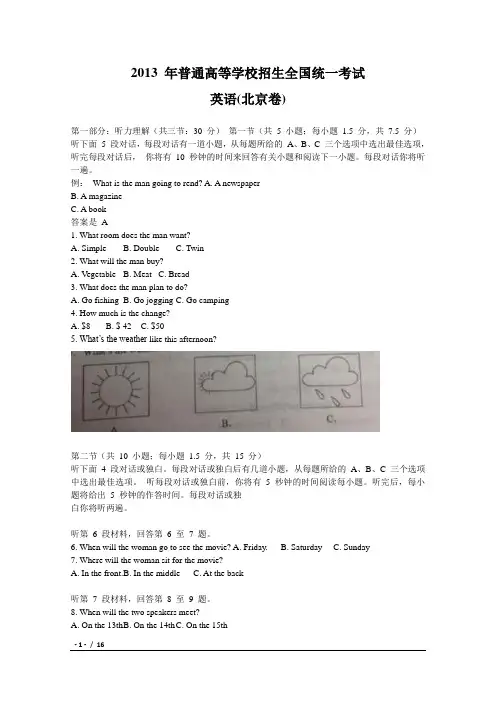
- 1 -/ 162013 年普通高等学校招生全国统一考试英语(北京卷)第一部分:听力理解(共三节:30 分)第一节(共 5 小题;每小题1.5 分,共7.5 分)听下面5 段对话,每段对话有一道小题,从每题所给的A、B、C 三个选项中选出最佳选项,听完每段对话后,你将有10 秒钟的时间来回答有关小题和阅读下一小题。
每段对话你将听一遍。
例:What is the man going to rend? A. A newspaperB. A magazineC. A book答案是A1. What room does the man want?A. SimpleB. DoubleC. Twin2. What will the man buy?A. VegetableB. MeatC. Bread3. What does the man plan to do?A. Go fishingB. Go joggingC. Go camping4. How much is the change?A. $8B. $ 42C. $505. What’s the weather like this afternoon?第二节(共10 小题;每小题 1.5 分,共15 分)听下面4 段对话或独白。
每段对话或独白后有几道小题,从每题所给的A、B、C 三个选项中选出最佳选项。
听每段对话或独白前,你将有 5 秒钟的时间阅读每小题。
听完后,每小题将给出5 秒钟的作答时间。
每段对话或独白你将听两遍。
听第6 段材料,回答第6 至7 题。
6. When will the woman go to see the movie? A. Friday. B. Saturday C. Sunday7. Where will the woman sit for the movie?A. In the front.B. In the middleC. At the back听第7 段材料,回答第8 至9 题。
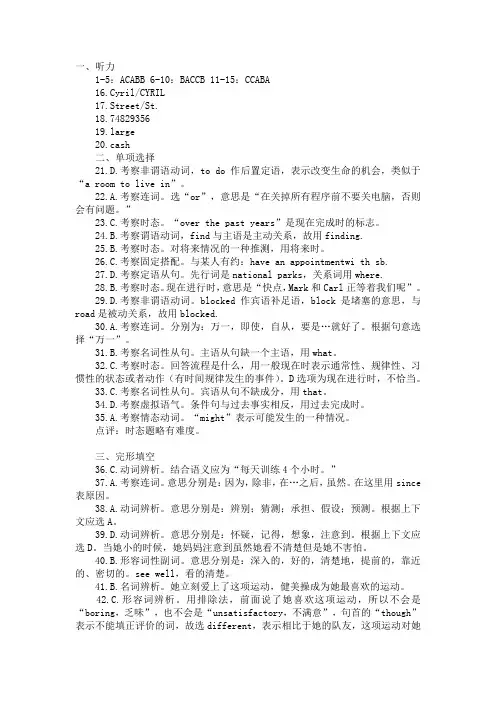
1-5:ACABB 6-10:BACCB 11-15:CCABA16.Cyril/CYRIL17.Street/St.18.74829356rge20.cash二、单项选择21.D.考察非谓语动词,to do作后置定语,表示改变生命的机会,类似于“a room to live in”。
22.A.考察连词。
选“or”,意思是“在关掉所有程序前不要关电脑,否则会有问题。
”23.C.考察时态。
“over the past years”是现在完成时的标志。
24.B.考察谓语动词,find与主语是主动关系,故用finding.25.B.考察时态。
对将来情况的一种推测,用将来时。
26.C.考察固定搭配。
与某人有约:have an appointmentwi th sb.27.D.考察定语从句。
先行词是national parks,关系词用where.28.B.考察时态。
现在进行时,意思是“快点,Mark和Carl正等着我们呢”。
29.D.考察非谓语动词。
blocked作宾语补足语,block是堵塞的意思,与road是被动关系,故用blocked.30.A.考察连词。
分别为:万一,即使,自从,要是…就好了。
根据句意选择“万一”。
31.B.考察名词性从句。
主语从句缺一个主语,用what。
32.C.考察时态。
回答流程是什么,用一般现在时表示通常性、规律性、习惯性的状态或者动作(有时间规律发生的事件)。
D选项为现在进行时,不恰当。
33.C.考察名词性从句。
宾语从句不缺成分,用that。
34.D.考察虚拟语气。
条件句与过去事实相反,用过去完成时。
35.A.考察情态动词。
“might”表示可能发生的一种情况。
点评:时态题略有难度。
三、完形填空36.C.动词辨析。
结合语义应为“每天训练4个小时。
”37.A.考察连词。
意思分别是:因为,除非,在…之后,虽然。
在这里用since 表原因。
38.A.动词辨析。
意思分别是:辨别;猜测;承担、假设;预测。
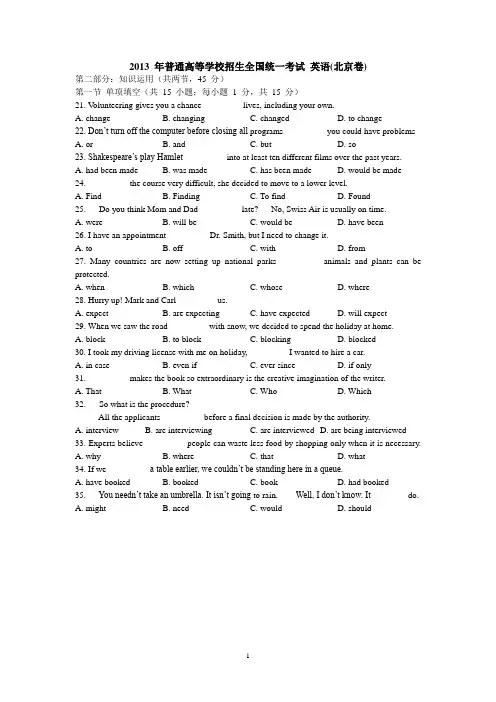
2013 年普通高等学校招生全国统一考试英语(北京卷)第二部分:知识运用(共两节,45 分)第一节单项填空(共15 小题;每小题1 分,共15 分)21. V olunteering gives you a chance_________ lives, including your own.A. changeB. changingC. changedD. to change22. Don’t turn off the computer before closing all programs _________ you could have problemsA. orB. andC. butD. so23. Shakespeare’s play Hamlet _________ into at least ten different films over the past years.A. had been madeB. was madeC. has been madeD. would be made24. _________ the course very difficult, she decided to move to a lower level.A. FindB. FindingC. To findD. Found25. --- Do you think Mom and Dad _________ late? --- No, Swiss Air is usually on time.A. wereB. will beC. would beD. have been26. I have an appointment _________ Dr. Smith, but I need to change it.A. toB. offC. withD. from27. Many countries are now setting up national parks _________ animals and plants can be protected.A. whenB. whichC. whoseD. where28. Hurry up! Mark and Carl _________us.A. expectB. are expectingC. have expectedD. will expect29. When we saw the road _________with snow, we decided to spend the holiday at home.A. blockB. to blockC. blockingD. blocked30. I took my driving license with me on holiday, _________I wanted to hire a car.A. in caseB. even ifC. ever sinceD. if only31. _________ makes the book so extraordinary is the creative imagination of the writer.A. ThatB. WhatC. WhoD. Which32. --- So what is the procedure?--- All the applicants _________ before a final decision is made by the authority.A. interviewB. are interviewingC. are interviewedD. are being interviewed33. Experts believe _________ people can waste less food by shopping only when it is necessary.A. whyB. whereC. thatD. what34. If we _________ a table earlier, we couldn’t be standing here in a queue.A. have bookedB. bookedC. bookD. had booked35. --- You needn’t take an umbrella. It isn’t going to rain. --- Well, I don’t know. It ________do.A. mightB. needC. wouldD. should第二节完形填空(共20 小题;每小题1.5 分,共30 分)A Leap(跳跃)to HonorLeaping on a narrow balance beam(平衡木)is not easy. But Lola Walter, a 13-year-old gymnast, is an expert at it.To perfect her skills, Lola ____36_____for four hours a day, five days a week. At the state championships in March, she finished seventh out of 16 girls. That’s especially impressive. ____37_____she is legally blind, born with a rare condition that causes her eyes to shift constantly. She often sees double and can’t ___38______ how far away things are.When she was little, her mom ____39_____ that even though she couldn’t see ____40_____, she was fearless. So her mom signed her up for gymnastics when she was three. She loved the ____41_____right away and gymnastics became her favorite. Though learning gymnastics has been more ____42_____for her than for some of her tournaments, she has never quit. She doesn’t let her ____43_____ stop her from doing anything that she wants to.She likes the determination it takes to do the sport. Her biggest ____44_____is the balance beam. Because she has double vision, she often sees two beams. She must use her sense of touch to help her during her routine. Sometimes she even closes her eyes. “You have to ____45_____your mind that it’ll take you where you want to go.” says Lola.To be a top-level gymnast, one must be brave. The beam is probably the most ____46_____ for anyone because it’s four inches wide. At the state competition, Lola didn’t fall ____47_____the beam. In fact, she got an 8.1 out of 10---- her highest score yet.Lola doesn’t want to be ____48_____differently from the other girls on her team. At the competitions, the judges don’t know about her vision ____49_____. She doesn’t tell them, because she doesn’t think they need to know. Her mom is am azed by her ____50____attitude.Lola never thinks about ____51_____. She is presently at level 7 while the highest is level 10 in gymnastics. Her _____52____is to reach level 9. She says she wants to be a gymnastics coach to pass down what she’s learned to other kids ____53_____she grew up.Lola is ____54_____of all her hard work and success. She says it’s helped her overcome problems in her life outside gymnastics, too. Her ____55_____for others is “just believe yourself”.36. A. runs B. teaches C. trains D. dances37. A. since B. unless C. after D. though38. A. tell B. guess C. assume D. predict39. A. suspected B remembered C. imagined D. noticed40. A. deeply B. well C. ahead D. closely41. A. task B. sport C. event D. show42. A. boring B. enjoyable C. different D. unsatisfactory43. A. talent B. quality C. nature D. condition44. A. doubt B. advantage C. challenge D. program45. A. examine B. express C. open D. trust46. A. fearful B. harmful C. unfair D. inconvenient47. A. to B. on C. off D. against48. A. greeted B. treated C. served D. paid49. A. pains B. stresses C. injuries D. problems50. A. positive B. friendly C. flexible D. caution51. A. defending B. quitting C. winning D. bargaining52. A. standard B. range C. view D. goal53. A. until B. as C. when D. before54. A. proud B. tired C. ashamed D. confident55. A. plan B. advice C. reward D. responsibility第三部分:阅读理解(共两节,20 分)第一节(共15 小题;每小题 2 分,共30 分)AEP Portable HeaterWe all know that the cost of heating our homes will continue to be a significant burden on the family budget. Now millions of people are saving on their heating bills with the EP Portable Heater. With over one million satisfied customers around the world, the new EP heats better and faster, saves more on heating bills, and runs almost silent.The EP has no exposed heating parts that can cause a fire. The outside of EP only gets warm to the touch so that it will not burn children or pets.The EP will not reduce oxygen in the room. With other heaters, you’ll notice that you get sleepy when the heat comes on because they are burning up oxygen.The advanced EP also heats the room evenly, wall to wall and floor to ceiling. It comfortably covers an area up to 350 square feet. Other heaters heat rooms unevenly with most of the heat concentrated to the center of the room. And they only heat an area a few feet around the heater. With the EP, the temperature will not vary in any part of the room.The EP comes with a 3-year warranty(保修) and a 60-day. No questions asked. Satisfaction guarantee. If you are not totally satisfied, return it to our expertise and your money will be given back to you.Now, we have a special offer for 10 days, during which you can enjoy a half price discount and a free delivery. if you order that, we reserve the right to either accept or reject order requests at the discounted price.Take action right now!56. What is mainly discussed in paragraph 2?A. the heat of the EPB. the safety of the EPC. the appearance of the EPD. the material of the EP57. From the passage, we can learn that the EP _________.A. doesn’t burn up oxygenB. runs without any noiseC. makes people get sleepyD. is unsuitable for children and pets58. The underlined word “evenly” in paragraph 4 probably means .A. continuouslyB. separatelyC. quicklyD. equally59. The main purpose of the passage is to_______.A. persuade people to buy the productB. advise people to save on heating billsC. report the new development of portable heatersD. compare the difference of different heart brandsBTaIL SpinTwo dolphins race around in a big pool in the OceanPark. The smaller dolphin Grace, shown off a few of hertricks, turning around and waving hello to the crowd. Themost amazing thing about her, however, is that she’s evenswimming at all. She doesn’t have a tail.Grace lost her tail as a baby when she got caught up in a fish trap.When the dolphin arrived at the Ocean Park in December 2005, she was fighting for her life. “Is she going to make it?” Her trainer, Abbey Stone, feared the worst. Grace did make it --- but her tail didn’t. She ended up losing her flukes and the lower part of her peduncle.Over the past six years, she has learned to swim without her tail. Dolphins swim by moving their flukes and peduncle up and down. Grace taught herself to move another way---like a fish! She pushed herself forward through the water by moving her peduncles from side to side.The movement put harmful pressure on Grace’s backbone. So a company offered to create a man-made tail for her. The tail had to be strong enough to stay on Grace as she swam but soft enough that it wouldn’t hurt her.The first time Grace wore the artificial tail. She soon shook it off and let it sink in the bottom of the pool. Now, she is still learning to use the tail. Some days she wears it for an hour at a time, others not at all. “The tail isn’t necessary for her to feel comfortable,”says Stone, “but it helps to keep that range of motion(动作) and build muscles(肌肉).”Now, the dolphin is about to get an even happier ending. This month, Grace will star in Dolphin Tale, a film that focus on her rescue and recovery. Her progress has inspired more than just a new movie. Many people travel from near and far to meet her. Seeing Grace swim with her man-made tail gives people so much courage.60. When Grace first arrived at the Ocean Park, her trainer worried about her .A. physical buildB. potential abilityC. chance of survivalD. adaptation to the surroundings.61. A man-made tail is created for Grace to _________.A. let her recover fasterB. make her comfortableC. adjust her way of swimmingD. help her perform better tricks62. The story of Grace inspires people to_______.A. stick to their dreamsB. treat animals friendlyC. treasure what they haveD. face difficulties bravelyCDoes Fame Drive You Crazy?Although being famous might sound like a dream come true, today’s star, feeling like zoo animals, face pressures that few of us can imagine. They are at the center of much of the world’s attention. Paparazzi (狗仔队) camp outside their homes, cameras ready. Tabloids (小报) publish thrilling stories about their personal lives. Just imagine not being able to do anything without being photographed or interrupted for a signature.According to psychologist Christina Villareal, celebrities —famous people —worry constantly about their public appearance. Eventually, they start to lose track of who they really are, seeing themselves the way their fans imagine them, not as the people they were before everyoneknew their names. “Over time,” Villareal says, “they feel separated and alone.”The phenomenon of tracking celebrities has been around for ages. In the 4th century B.C., painters followed Alexander the Great into battle, hoping to picture his victories for his admirers. When Charles Dickens visited America in the 19th century, his sold-out readings attracted thousands of fans, leading him to complain (抱怨) about his lack of privacy. Tabloids of the 1920s and 1930s ran articles about film-stars in much the same way that modern tabloids and websites do.Being a public figure today, however, is a lot more difficult than it used to be. Superstars cannot move about without worrying about photographers with modern cameras. When they say something silly or do something ridiculous, there is always the Internet to spread the news in minutes and keep their “story” alive forever.If fame is so troublesome, why aren’t all celebrities running away from it? The answer is there are still ways to deal with it. Some stars stay calm by surrounding themselves with trusted friends and family or by escaping to remote places away from big cities. They focus not on how famous they are but on what they love to do or whatever made them famous in the first place.Sometimes a few celebrities can get a little justice. Still, even stars who enjoy full justice often complain about how hard their lives are. They are tired of being famous already.63. It can be learned from the passage that stars today________.A. are often misunderstood by the publicB. can no longer have their privacy protectedC. spend too much on their public appearanceD. care little about how they have come into fame64. What is the main idea of Paragraph 3?A. Great heroes of the past were generally admired.B. The problem faced by celebrities has a long history.C. Well-known actors are usually targets of tabloids.D. Works of popular writers often have a lot of readers.65. What makes it much harder to be a celebrity today?A. Availability of modern media.B. Inadequate social recognition.C. Lack of favorable chances.D. Huge population of fans.66. What is the author’s attitude toward modern celebrity?A. Sincere.B. Skeptical.C. Disapproving.D. Sympathetic.DMultitaskingPeople who multitask all the time may be the worst at doing two things at once, a new research suggests. The findings, based on performances and self-evaluation by about 275 college students, indicate that many people multitask not out of a desire to increase productivity, but because they are easily distracted (分心) and can’t focus on one activity. And “those people turn out to be the worst at handling different things,” said David Sanbonmatsu, a psychologist at the University of Utah.Sanbonmatsu and his colleagues gave the students a set of tests and asked them to report how often they multitasked, how good they thought they were at it, and how sensation-seeking (寻求刺激) or imperative (冲动) they were. They then evaluated the participants’ mult itasking ability with a tricky mental task that required the students to do simple mathematical calculations whileremembering a set of letters.Not surprisingly, the scientists said, most people thought they were better than average at multitasking, and those who thought they were better at it were more likely to report using a cellphone while driving or viewing multiple kinds of media at once. But those who frequently deal with many things at the same time were found to perform the worst at the actual multitasking test. They also were more likely to admit to sensation-seeking and impulsive behavior, which connects with how easily people get bored and distracted.“People multitask not because it’s going to lead to greater productivity, but because they’re d istractible, and they get sucked into things that are not as important.” Sanbonmatsu said.Adam Gazzaley, a researcher at the University of California, San Francisco, who was not a member of the research group, said one limitation of the study was that it couldn’t find out whether people who start out less focused toward multitasking or whether people’s recognizing and understanding abilities change as a result of multitasking.The findings do suggest, however, why the sensation-seeker who multitask the most may enjoy risky distracted driving. “People who are multitasking are generally less sensitive to risky situations.” said Paul Atchley, another researcher not in the group. “This may partly explain why people go in for these situations even though they’re dangerous.”67. The research led by Sanbonmatsu indicates that people who multitask ________.A. seek high productivity constantlyB. prefer handling different things when getting boredC. are more focused when doing many things at a timeD. have the poorest results in doing various things at the same time68. When Sanbonmatsu and his colleagues conducted their research, they________.A. assessed the multitasking ability of the studentsB. evaluated the academic achievements of the studentsC. analyzed the effects of the participants’ tricky mental tasksD. measured the changes of the students’ understanding ability69. According to Sanbonmatsu, people multitask because of their________.A. limited power in calculationB. interests in doing things differentlyC. inability to concentrate on one taskD. impulsive desire to try new things70. From the last paragraph, we can learn that multitaskers usually________.A. drive very skillfullyB. go in for different tasksC. fail to react quickly to potential dangersD. refuse to explain the reasons for their behavior第二节(共5 小题;每小题 2 分。
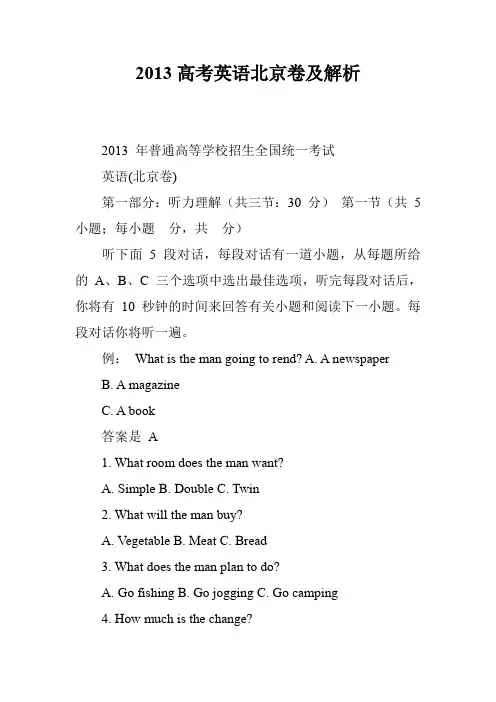
2013高考英语北京卷及解析2013 年普通高等学校招生全国统一考试英语(北京卷)第一部分:听力理解(共三节:30 分)第一节(共 5 小题;每小题分,共分)听下面 5 段对话,每段对话有一道小题,从每题所给的A、B、C 三个选项中选出最佳选项,听完每段对话后,你将有10 秒钟的时间来回答有关小题和阅读下一小题。
每段对话你将听一遍。
例:What is the man going to rend? A. A newspaperB. A magazineC. A book答案是 A1. What room does the man want?A. SimpleB. DoubleC. Twin2. What will the man buy?A. VegetableB. MeatC. Bread3. What does the man plan to do?A. Go fishingB. Go joggingC. Go camping4. How much is the change?A. $8B. $ 42C. $505. What’s the weather like this afternoon?第二节(共10 小题;每小题分,共15 分)听下面 4 段对话或独白。
每段对话或独白后有几道小题,从每题所给的A、B、C 三个选项中选出最佳选项。
听每段对话或独白前,你将有 5 秒钟的时间阅读每小题。
听完后,每小题将给出5 秒钟的作答时间。
每段对话或独白你将听两遍。
听第 6 段材料,回答第6 至7 题。
6. When will the woman go to see the movie? A. Friday. B. Saturday C. Sunday7. Where will the woman sit for the movie?A. In the front.B. In the middleC. At the back听第7 段材料,回答第8 至9 题。
![[精品]2013年全国统一考试英语试卷北京卷及答案](https://uimg.taocdn.com/356ccc440b1c59eef8c7b46d.webp)
2013 年普通高等学校招生全国统一考试英语(北京卷)第一部分:听力理解(共三节:30 分)第一节(共 5 小题;每小题1.5 分,共 7.5 分)听下面 5 段对话,每段对话有一道小题,从每题所给的 A、B、C 三个选项中选出最佳选项,听完每段对话后,你将有 10 秒钟的时间来回答有关小题和阅读下一小题。
每段对话你将听一遍。
例: What is the man going to rend? A. A newspaperB. A magazineC. A book答案是 A1. What room does the man want?A. SimpleB. DoubleC. Twin2. What will the man buy?A. VegetableB. MeatC. Bread3. What does the man plan to do?A. Go fishingB. Go joggingC. Go camping4. How much is the change?A. $8B. $ 42C. $505. What’s the weather like this afternoon?第二节(共 10 小题;每小题 1.5 分,共 15 分)听下面 4 段对话或独白。
每段对话或独白后有几道小题,从每题所给的 A、B、C 三个选项中选出最佳选项。
听每段对话或独白前,你将有 5 秒钟的时间阅读每小题。
听完后,每小题将给出 5 秒钟的作答时间。
每段对话或独白你将听两遍。
听第 6 段材料,回答第 6 至 7 题。
6. When will the woman go to see the movie? A. Friday. B. Saturday C. Sunday7. Where will the woman sit for the movie?A. In the front.B. In the middleC. At the back听第 7 段材料,回答第 8 至 9 题。
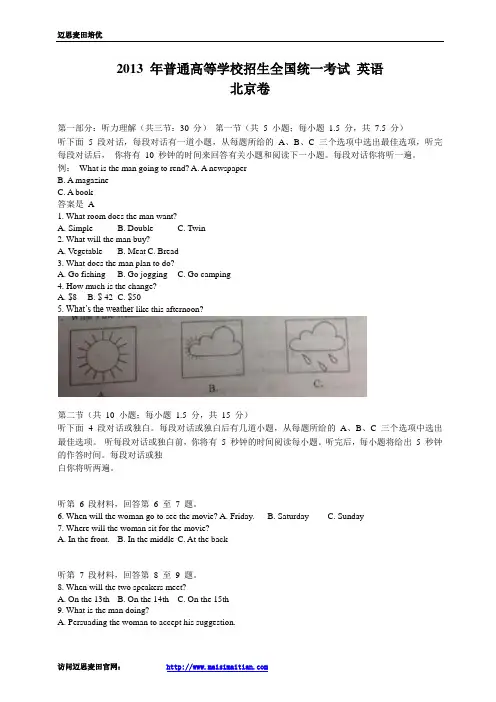
2013 年普通高等学校招生全国统一考试英语北京卷第一部分:听力理解(共三节:30 分)第一节(共 5 小题;每小题1.5 分,共7.5 分)听下面 5 段对话,每段对话有一道小题,从每题所给的A、B、C 三个选项中选出最佳选项,听完每段对话后,你将有10 秒钟的时间来回答有关小题和阅读下一小题。
每段对话你将听一遍。
例:What is the man going to rend? A. A newspaperB. A magazineC. A book答案是A1. What room does the man want?A. SimpleB. DoubleC. Twin2. What will the man buy?A. VegetableB. MeatC. Bread3. What does the man plan to do?A. Go fishingB. Go joggingC. Go camping4. How much is the change?A. $8B. $ 42C. $505. What’s the weather like this afternoon?第二节(共10 小题;每小题 1.5 分,共15 分)听下面 4 段对话或独白。
每段对话或独白后有几道小题,从每题所给的A、B、C 三个选项中选出最佳选项。
听每段对话或独白前,你将有5 秒钟的时间阅读每小题。
听完后,每小题将给出5 秒钟的作答时间。
每段对话或独白你将听两遍。
听第 6 段材料,回答第6 至7 题。
6. When will the woman go to see the movie? A. Friday. B. Saturday C. Sunday7. Where will the woman sit for the movie?A. In the front.B. In the middleC. At the back听第7 段材料,回答第8 至9 题。
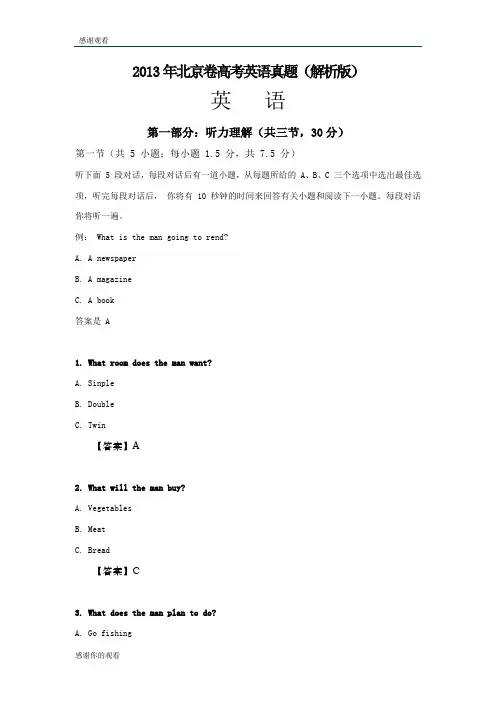
2013年北京卷高考英语真题(解析版)英语第一部分:听力理解(共三节,30分)第一节(共 5 小题;每小题 1.5 分,共 7.5 分)听下面 5 段对话,每段对话后有一道小题,从每题所给的 A、B、C 三个选项中选出最佳选项,听完每段对话后,你将有 10 秒钟的时间来回答有关小题和阅读下一小题。
每段对话你将听一遍。
例: What is the man going to rend?A. A newspaperB. A magazineC. A book答案是 A1. What room does the man want?A. SinpleB. DoubleC. Twin【答案】A2. What will the man buy?A. VegetablesB. MeatC. Bread【答案】C3. What does the man plan to do?A. Go fishingB. Go joggingC. Go camping【答案】A4. How much is the change?A. $8B. $ 42C. $50【答案】B5. What’s the weather like this afternoon?【答案】B第二节(共 10 小题;每小题 1.5 分,共 15 分)听下面 4 段对话或独白。
每段对话或独白后有几道小题,从每题所给的 A、B、C 三个选项中选出最佳选项。
听每段对话或独白前,你将有 5 秒钟的时间阅读每小题。
听完后,每小题将给出 5 秒钟的作答时间。
每段对话或独白你将听两遍。
听第 6 段材料,回答第 6 至 7 题。
6. When will the woman go to see the movie?A. Friday.B. SaturdayC. Sunday【答案】B7. Where will the woman sit for the movie?B. In the middleC. At the back【答案】A听第 7 段材料,回答第 8 至 9 题。
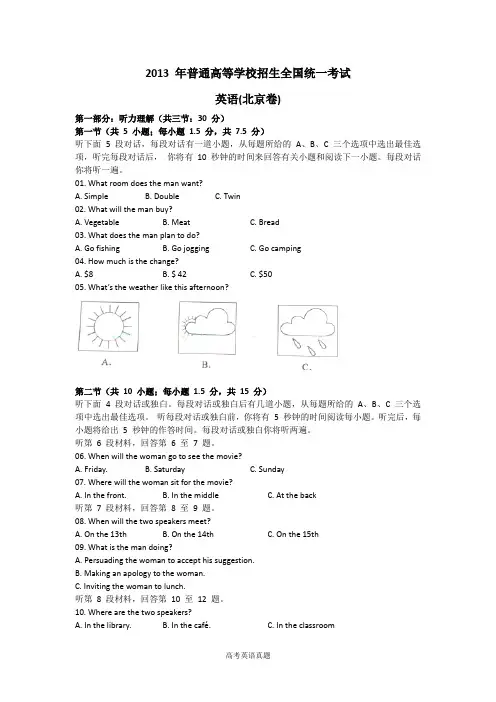
2013 年普通高等学校招生全国统一考试英语(北京卷)第一部分:听力理解(共三节:30 分)第一节(共5 小题;每小题 1.5 分,共7.5 分)听下面 5 段对话,每段对话有一道小题,从每题所给的A、B、C 三个选项中选出最佳选项,听完每段对话后,你将有10 秒钟的时间来回答有关小题和阅读下一小题。
每段对话你将听一遍。
01. What room does the man want?A. SimpleB. DoubleC. Twin02. What will the man buy?A. VegetableB. MeatC. Bread03. What does the man plan to do?A. Go fishingB. Go joggingC. Go camping04. How much is the change?A. $8B. $ 42C. $5005. What’s the weather like this afternoon?第二节(共10 小题;每小题 1.5 分,共15 分)听下面 4 段对话或独白。
每段对话或独白后有几道小题,从每题所给的A、B、C 三个选项中选出最佳选项。
听每段对话或独白前,你将有5 秒钟的时间阅读每小题。
听完后,每小题将给出5 秒钟的作答时间。
每段对话或独白你将听两遍。
听第6 段材料,回答第 6 至7 题。
06. When will the woman go to see the movie?A. Friday.B. SaturdayC. Sunday07. Where will the woman sit for the movie?A. In the front.B. In the middleC. At the back听第7 段材料,回答第8 至9 题。
08. When will the two speakers meet?A. On the 13thB. On the 14thC. On the 15th09. What is the man doing?A. Persuading the woman to accept his suggestion.B. Making an apology to the woman.C. Inviting the woman to lunch.听第8 段材料,回答第10 至12 题。
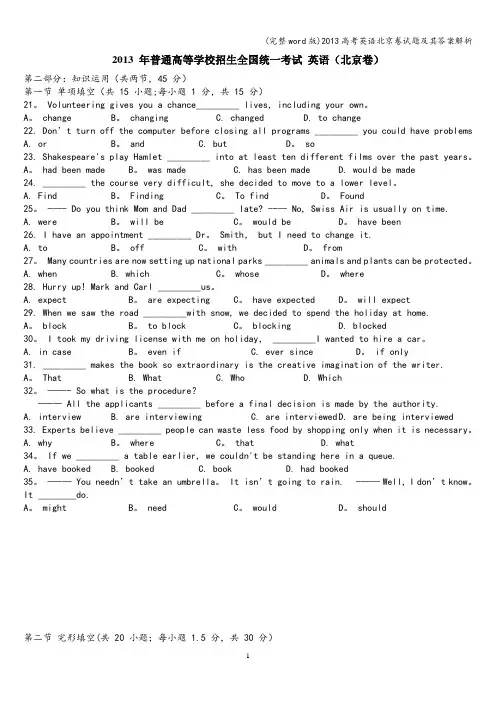
2013 年普通高等学校招生全国统一考试英语(北京卷)第二部分:知识运用(共两节,45 分)第一节单项填空(共 15 小题;每小题 1 分,共 15 分)21。
Volunteering gives you a chance_________ lives, including your own。
A。
change B。
changing C. changed D. to change22. Don’t turn off the computer before closing all programs _________ you could have problemsA. or B。
and C. but D。
so23. Shakespeare's play Hamlet _________ into at least ten different films over the past years。
A。
had been made B。
was made C. has been made D. would be made24. _________ the course very difficult, she decided to move to a lower level。
A. Find B。
Finding C。
To find D。
Found25。
-—- Do you think Mom and Dad _________ late? --— No, Swiss Air is usually on time.A. were B。
will be C。
would be D。
have been26. I have an appointment _________ Dr。
Smith, but I need to change it.A. to B。
off C。
with D。
from27。
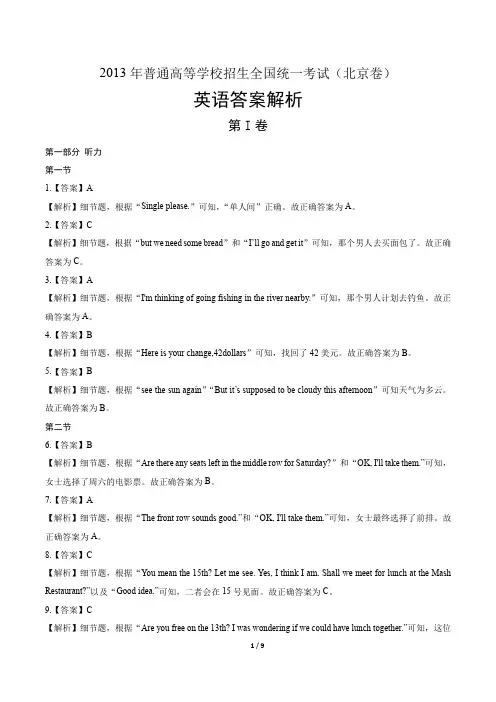
2013年普通高等学校招生全国统一考试(北京卷)英语答案解析第I卷第一部分听力第一节1.【答案】A【解析】细节题,根据“Single please.”可知,“单人间”正确。
故正确答案为A。
2.【答案】C【解析】细节题,根据“but we need some bread”和“I’ll go and get it”可知,那个男人去买面包了。
故正确答案为C。
3.【答案】A【解析】细节题,根据“I'm thinking of going fishing in the river nearby.”可知,那个男人计划去钓鱼。
故正确答案为A。
4.【答案】B【解析】细节题,根据“Here is your change,42dollars”可知,找回了42美元。
故正确答案为B。
5.【答案】B【解析】细节题,根据“see the sun again”“But it’s supposed to be cloudy this afternoon”可知天气为多云。
故正确答案为B。
第二节6.【答案】B【解析】细节题,根据“Are there any seats left in the middle row for Saturday?”和“OK, I'll take them.”可知,女士选择了周六的电影票。
故正确答案为B。
7.【答案】A【解析】细节题,根据“The front row sounds good.”和“OK, I'll take them.”可知,女士最终选择了前排。
故正确答案为A。
8.【答案】C【解析】细节题,根据“You mean the 15th? Let me see. Yes, I think I am. Shall we meet for lunch at the Mash Restaurant?”以及“Good idea.”可知,二者会在15号见面。
故正确答案为C。
9.【答案】C【解析】细节题,根据“Are you free on the 13th? I was wondering if we could have lunch together.”可知,这位男人在约这位女士吃午饭。
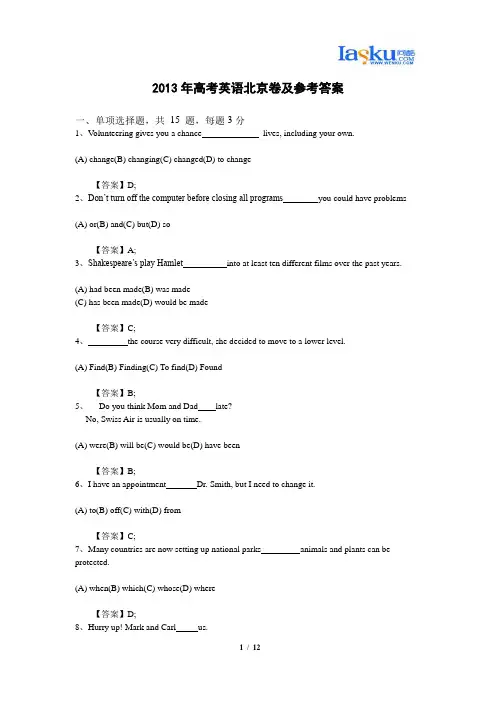
2013年高考英语北京卷及参考答案一、单项选择题,共15 题,每题3分1、V olunteering gives you a chance lives, including your own.(A) change(B) changing(C) changed(D) to change【答案】D;2、Don’t turn off the computer before closing all programs you could have problems(A) or(B) and(C) but(D) so【答案】A;3、Shakespeare’s play Hamlet into at least ten different films over the past years.(A) had been made(B) was made(C) has been made(D) would be made【答案】C;4、the course very difficult, she decided to move to a lower level.(A) Find(B) Finding(C) To find(D) Found【答案】B;5、--- Do you think Mom and Dad late?--- No, Swiss Air is usually on time.(A) were(B) will be(C) would be(D) have been【答案】B;6、I have an appointment Dr. Smith, but I need to change it.(A) to(B) off(C) with(D) from【答案】C;7、Many countries are now setting up national parks animals and plants can be protected.(A) when(B) which(C) whose(D) where【答案】D;8、Hurry up! Mark and Carl us.(A) expect(B) are expecting(C) have expected(D) will expect【答案】B;9、When we saw the road with snow, we decided to spend the holiday at home.(A) block(B) to block(C) blocking(D) blocked【答案】D;10、I took my driving license with me on holiday, I wanted to hire a car.(A) in case(B) even if(C) ever since(D) if only【答案】A;11、makes the book so extraordinary is the creative imagination of the writer.(A) That(B) What(C) Who(D) Which【答案】B;12、--- So what is the procedure?--- All the applicants before a final decision is made by the authority.(A) interview(B) are interviewing(C) are interviewed(D) are being interviewed【答案】C;13、Experts believe people can waste less food by shopping only when it is necessary.(A) why(B) where(C) that(D) what【答案】C;14、If we a table earlier, we couldn’t be standing here in a queue.(A) have booked(B) booked(C) book(D) had booked【答案】D;15、--- You needn’t take an umbrella. It isn’t going to rain.--- Well, I don’t know. It do.(A) might(B) need(C) would(D) should【答案】A;二、解答题,共7 题,每题8分1、A Leap(跳跃)to HonorLeaping on a narrow balance beam(平衡木)is not easy. But Lola Walter, a 13-year-old gymnast, is an expert at it.(1)A. runs B. teaches C. trains D. dances(2)A. since B. unless C. after D. though(3)A. tell B. guess C. assume D. predict(4)A. suspected B remembered C. imagined D. noticed(5) A. deeply B. well C. ahead D. closely(6)A. task B. sport C. event D. show(7) A. boring B. enjoyable C. different D. unsatisfactory(8) A. talent B. quality C. nature D. condition(9) A. doubt B. advantage C. challenge D. program(10)A. examine B. express C. open D. trust(11)A. fearful B. harmful C. unfair D. inconvenient(12)A. to B. on C. off D. against(13)A. greeted B. treated C. served D. paid(14)A. pains B. stresses C. injuries D. problems(15)A. positive B. friendly C. flexible D. caution(16)A. defending B. quitting C. winning D. bargaining(17)A. standard B. range C. view D. goal(18)A. until B. as C. when D. before(19)A. proud B. tired C. ashamed D. confident(20)A. plan B. advice C. reward D. responsibility【答案】CAADB;BCDCD;ACBDA;BDCAB ;2、EP Portable HeaterWe all know that the cost of heating our homes will continue to be a significant burden on the family budget. Now millions of people are saving on their heating bills with the EP Portable Heater. With over one million satisfied customers around the world, the new EP heats better and faster, saves more on heating bills, and runs almost silent.(1)What is mainly discussed in paragraph 2?A. the heat of the EPB. the safety of the EPC. the appearance of the EPD. the material of the EP(2)From the passage, we can learn that the EP .A. doesn’t burn up oxygenB. runs without any noiseC. makes people get sleepyD. is unsuitable for children and pets(3)The underlined word “evenly”in paragraph 4 probably means .A. continuouslyB. separatelyC. quicklyD. equally(4)The main purpose of the passage is to .A. persuade people to buy the productB. advise people to save on heating billsC. report the new development of portable heatersD. compare the difference of different heart brands【答案】BADA ;3、TaIL SpinTwo dolphins race around in a big pool in the Ocean Park. The smaller dolphin Grace, shown off a few of her tricks, turning around and waving hello to the crowd. The most amazing thing about her, however, is that she’s even swimming at all. She doesn’t have a tail.(1)When Grace first arrived at the Ocean Park, her trainer worried about her .A. physical buildB. potential abilityC. chance of survivalD. adaptation to the surroundings.(2)A man-made tail is created for Grace to _.A. let her recover fasterB. make her comfortableC. adjust her way of swimmingD. help her perform better tricks(3)The story of Grace inspires people to_ .A. stick to their dreamsB. treat animals friendlyC. treasure what they haveD. face difficulties bravely【答案】C;C;D;4、Does Fame Drive You Crazy?Although being famous might sound like a dream come true, today’s star, feeling like zoo animals, face pressures that few of us can imagine. They are at the center of much of the world’s attention. Paparazzi (狗仔队) camp outside their homes, cameras ready. Tabloids (小报) publish thrilling stories about their personal lives. Just(3)What makes it much harder to be a celebrity today?A. Availability of modern media.B. Inadequate social recognition.C. Lack of favorable chances.D. Huge population of fans.(4)What is the author’s attitude toward modern celebrity?A. Sincere.B. Sceptical.C. Disapproving.D. Sympathetic.【答案】B;B;A;D;5、MultitaskingPeople who multitask all the time may be the worst at doing two things at once, a new research suggests. The findings, based on performances and self-evaluation by about 275 college students, indicate that manypeople multitask not out of a desire to increase productivity, but because they are easily distracted (分心) and can’t focus on one activity. And “those people turn out to be the worst at handling different things,”said David sanbonmatsu, a psychologist at the University of Utah.Sanbonmatsu and his colleagues gave the students a set of tests and asked them to report how often they multitasked, how good they thought they were at it, and how sensation-seeking (寻求刺激) or imperative (冲动)they were. They then evaluated the participan ts’ multitasking ability with a tricky mental task that required the students to do simple mathematical calculations while remembering a set of letters.Not surprisingly, the scientists said, most people thought they were better than average at multitasking, and those who thought they were better at it were more likely to report using a cellphone while driving or viewing multiple kinds of media at once. But those who frequently deal with many things at the same time were found to perform the worst at the actual multitasking test. They also were more likely to admit to sensation-seeking and impulsive behavior, which connects with how easily people get bored and distracted.“People multitask not because it’s going to lead to greater productivity, but because they’re distractible, and they get sucked into things that are not as important.” Sanbonmatsu said.Adam Gazzaley, a researcher at the University of California, San Francisco, who was not a member of the research group, sa id one limitation of the study was that it couldn’t find out whether people who start out less focused toward multitasking or whether people’s recognizing and understanding abilities change as a result of multitasking.The findings do suggest, however, why the sensation-seeker who multitask the most may enjoy risky distracted driving. “People who are multitasking are generally less sensitive to risky situations.” said Paul Atchley, another researcher not in the group. “This may partly explain why people go in for these situations even though they’re dangerous.”(1)The research led by Sanbonmatsu indicates that people who multitask .A. seek high productivity constantlyB. prefer handling different things when getting boredC. are more focused when doing many things at a timeD. have the poorest results in doing various things at the same time(2)When Sanbonmatsu and his colleagues conducted their research, they .A. assessed the multitasking ability of the studentsB. evaluated the academic achievements of the studentsC. analyzed the effects of the participants’ tricky mental tasksD. measured the changes of the students’ understanding ability(3)According to Sanbonmatsu, people multitask because of their _.A. limited power in calculationB. interests in doing things differentlyC. inability to concentrate on one taskD. impulsive desire to try new things(4)From the last paragraph, we can learn that multitaskers usually .A. drive very skillfullyB. go in for different tasksC. fail to react quickly to potential dangersD. refuse to explain the reasons for their behavior【答案】DACC ;6、UrbanizationUntil relatively recently, the vast majority of human beings lived and died without ever seeing a city. The first city was probably founded no more than 5,500 years ago 1 . In fact, nearly everyone lived on farms or in tiny rural (乡村的) villages. It was not until the 20th century that Great Britain became the first urban society in history--- a society in which the majority of people live in cities and do not farm for a living.A. That kept cities very small.B. The rest live in small towns.C. The effects of urban living on people should be considered.D. Soon many other industrial nations become urban societies.E. But even 200 years ago, only a few people could live in cities.F. Modernization drew people to the cities and made farmers more productive.G. Modern cities have destroyed social relations and the health of human beings.【答案】EDBAF ;7、假设你是红星中学高三(1)班的学生李华,请按照以下四幅图的先后顺序,用英文写一篇周记。
北京2013年高考英语试题答案与解析2013北京高考英语试卷答案与逐题解析第一节:单项填空21 【答案】D 【译文】做志愿者工作可以给你机会去改变生命,也包括你自己的生命。
【解析】题干中已经有谓语动词gives,故A选项change动词谓语形式不能入选,只能选非谓语形式,而用来修饰chance的后置定语,doing表示正在,done表示被动,to do表示未发生,根据句意,可以轻松选出D选项。
22 【答案】A 【译文】在关闭所有程序前不要关闭电脑,否则你可能会有麻烦。
【解析】考查连词,根据句意逻辑可以轻松选出or否则。
23 【答案】C 【译文】莎士比亚的剧本哈姆雷特在过年的几年中被拍成至少十部不同的影片。
【解析】over the past years是现在完成时明显标志,考生可以直接入选。
虽然翻译成“在过去的几年中”,但实际上还是指从过去截至到现在,也应该用现在完成时。
24 【答案】B 【译文】发现这个课程比较难,她决定转到更低的难度级别。
【解析】题干中已有decided谓语动词,故A选项find动词谓语形式不能入选;D选线found是done的形式,表被动,也不对;C选项to find位于句首表目的,翻译成“为了”,意思不对,所以选B选项ing形式,表示伴随。
25 【答案】B 【译文】- 你认为妈妈和爸爸会晚吗? - 不会的,瑞士航空一般比较准时。
【解析】根据句意可以轻松选出will,此题属于简单题。
26 【答案】C 【译文】我预约了Smith大夫,但是我现在需要改变一下预约。
【解析】have an appointment with与某人预约。
27 【答案】D 【译文】许多国家现在都正在建造国家公园,动物和植物在里面可以得到保护。
【解析】考查定语从句,从句完整且修改的是地点,故选where。
28 【答案】B 【译文】快点!Mark和Carl在等我们呢。
【解析】本题有较强的语境,Hurry up体现出别人正在等你,所以选B。
2013 年普通高等学校招生全国统一考试英语(北京卷)第一部分:听力理解(共三节:30 分)第一节(共 5 小题;每小题1.5 分,共7.5 分)听下面5 段对话,每段对话有一道小题,从每题所给的A、B、C 三个选项中选出最佳选项,听完每段对话后,你将有10 秒钟的时间来回答有关小题和阅读下一小题。
每段对话你将听一遍。
例:What is the man going to rend? A. A newspaperB. A magazineC. A book答案是A1. What room does the man want?A. SimpleB. DoubleC. Twin2. What will the man buy?A. VegetableB. MeatC. Bread3. What does the man plan to do?A. Go fishingB. Go joggingC. Go camping4. How much is the change?A. $8B. $ 42C. $505. What’s the weather like this afternoon?第二节(共10 小题;每小题 1.5 分,共15 分)听下面4 段对话或独白。
每段对话或独白后有几道小题,从每题所给的A、B、C 三个选项中选出最佳选项。
听每段对话或独白前,你将有5 秒钟的时间阅读每小题。
听完后,每小题将给出5 秒钟的作答时间。
每段对话或独白你将听两遍。
听第6 段材料,回答第6 至7 题。
6. When will the woman go to see the movie? A. Friday. B. Saturday C. Sunday7. Where will the woman sit for the movie?A. In the front.B. In the middleC. At the back听第7 段材料,回答第8 至9 题。
姓名座位号绝密★启用前2013年普通高等学校招生全国统一考试(北京卷)英语本试卷满分150分。
考试时长120分钟。
考生务必将答案答在答题卡上。
在试卷上作答无效。
考试结束后,将本试卷和答题卡一并交回。
第一部分:听力理解(共三节:30 分)第一节(共5 小题;每小题1.5 分,共7.5 分)听下面5 段对话,每段对话有一道小题,从每题所给的A、B、C 三个选项中选出最佳选项,听完每段对话后,你将有10 秒钟的时间来回答有关小题和阅读下一小题。
每段对话你将听一遍。
例:What is the man going to read?A.A newspaper. B.A magazine. C.A book.答案是A.1.What room does the man want?A.Sigle. B.Double. C.Twin.2.What will the man buy?A.Vegetables. B.Meat. C.Bread.3.What does the man plan to do?A.Go fishing. B.Go jogging. C.Go camping.4.How much is the change?A.$8. B.$ 42. C.$50.5.What’s the weather like this afternoon?第二节(共10 小题;每小题1.5 分,共15 分)听下面4 段对话或独白。
每段对话或独白后有几道小题,从每题所给的A、B、C 三个选项中选出最佳选项。
听每段对话或独白前,你将有 5 秒钟的时间阅读每小题。
听完后,每小题将给出5 秒钟的作答时间。
每段对话或独白你将听两遍。
听第6 段材料,回答第 6 至7 题。
6.When will the woman go to see the movie?A.Friday.B.Saturday. C.Sunday.7.Where will the woman sit for the movie?A.In the front.B.In the middle. C.At the back.听第7 段材料,回答第8 至9 题。
2013 年普通高等学校招生全国统一考试英语(北京卷)第一部分:听力理解(共三节:30 分)第一节(共 5 小题;每小题 1.5 分,共 7.5 分)听下面 5 段对话,每段对话有一道小题,从每题所给的 A、B、C 三个选项中选出最佳选项,听完每段对话后,你将有 10 秒钟的时间来回答有关小题和阅读下一小题。
每段对话你将听一遍。
例: What is the man going to rend? A. A newspaperB. A magazineC. A book答案是 A1. What room does the man want?A. SimpleB. DoubleC. Twin2. What will the man buy?A. VegetableB. MeatC. Bread3. What does the man plan to do?A. Go fishingB. Go joggingC. Go camping4. How much is the change?A. $8B. $ 42C. $50like this afternoon?5. What’s the weather第二节(共 10 小题;每小题 1.5 分,共 15 分)听下面 4 段对话或独白。
每段对话或独白后有几道小题,从每题所给的 A、B、C 三个选项中选出最佳选项。
听每段对话或独白前,你将有 5 秒钟的时间阅读每小题。
听完后,每小题将给出 5 秒钟的作答时间。
每段对话或独白你将听两遍。
听第 6 段材料,回答第 6 至 7 题。
6. When will the woman go to see the movie? A. Friday. B. Saturday C. Sunday7. Where will the woman sit for the movie?A. In the front.B. In the middleC. At the back听第 7 段材料,回答第 8 至 9 题。
2013年北京卷高考英语真题(解析版)英语第一部分:听力理解(共三节,30分)第一节(共5 小题;每小题1.5 分,共7.5 分)听下面5 段对话,每段对话后有一道小题,从每题所给的A、B、C 三个选项中选出最佳选项,听完每段对话后,你将有10 秒钟的时间来回答有关小题和阅读下一小题。
每段对话你将听一遍。
例:What is the man going to rend?A. A newspaperB. A magazineC. A book答案是A1. What room does the man want?A. SinpleB. DoubleC. Twin【答案】A2. What will the man buy?A. VegetablesB. MeatC. Bread【答案】C3. What does the man plan to do?A. Go fishingB. Go joggingC. Go camping【答案】A4. How much is the change?A. $8B. $ 42C. $50【答案】B5. What’s the weather like this afternoon?【答案】B第二节(共10 小题;每小题1.5 分,共15 分)听下面4 段对话或独白。
每段对话或独白后有几道小题,从每题所给的A、B、C 三个选项中选出最佳选项。
听每段对话或独白前,你将有5 秒钟的时间阅读每小题。
听完后,每小题将给出5 秒钟的作答时间。
每段对话或独白你将听两遍。
听第6 段材料,回答第6 至7 题。
6. When will the woman go to see the movie?A. Friday.B. SaturdayC. Sunday【答案】B7. Where will the woman sit for the movie?B. In the middleC. At the back【答案】A听第7 段材料,回答第8 至9 题。
2013高考北京卷英语试题及答案word版一、听力理解(共20分)1. What is the woman going to do?A. Buy a coat.B. Return a coat.C. Keep the coat.2. What does the man mean?A. He forgot his appointment.B. He can't make the appointment.C. He'll be late for the appointment.3. Where does this conversation take place?A. In a restaurant.B. In a bookstore.C. In a library.4. What are the speakers mainly talking about?A. A trip.B. A party.C. A meeting.5. What does the woman suggest the man do?A. Take a break.B. Change his job.C. Find a new apartment.二、知识运用(共45分)第一节单项填空(共15分)6. The teacher asked the students to stop ________ and listen to her carefully.A. talkingB. to talkC. talkD. talked7. ________ the bad weather, they decided to put off the sports meeting.A. Because ofB. Due toC. As forD. In case of8. ________ the problem, they tried many different methods.A. To solveB. SolvingC. SolvedD. Solve9. The old man ________ in the chair, with his eyes half-closed.A. seatedB. seatsC. was seatedD. is seated10. ________ the news, he felt very excited.A. To hearB. HearingC. Having heardD. Heard第二节完形填空(共15分)11. A. surprised B. disappointed C. excited D. bored12. A. because B. unless C. although D. if13. A. interested B. bored C. worried D. relaxed14. A. to find B. finding C. found D. find15. A. but B. and C. or D. so第三节阅读理解(共15分)16. What is the main idea of the passage?A. The importance of a good first impression.B. The impact of body language on communication.C. The role of non-verbal cues in business settings.D. The significance of eye contact in social interactions.17. According to the passage, which of the following is NOT a non-verbal cue?A. Facial expressions.B. Voice tones.C. Clothing choices.D. Written words.18. What does the author suggest about maintaining eye contact?A. It should be avoided in certain cultures.B. It can make a person appear more confident.C. It should be practiced regularly.D. It is not necessaryin all situations.19. What is the author's purpose in writing this passage?A. To provide tips for job interviews.B. To explain the concept of non-verbal communication.C. To encourage better communication skills.D. To discussthe importance of body language.三、写作(共35分)20. Write an essay of about 120 words on the following topic: "The Role of Technology in Modern Education"Your essay should include:- The importance of technology in education- The benefits of using technology in the classroom- Your personal opinion on the impact of technology on learning参考答案:一、听力理解1-5: BACBA二、知识运用第一节单项填空6-10: ABBCB第二节完形填空11-15: CABBD第三节阅读理解16-19: BADC三、写作[略]。
北京2013年高考英语试题答案与解析2013北京高考英语试卷答案与逐题解析第一节:单项填空21 【答案】D 【译文】做志愿者工作可以给你机会去改变生命,也包括你自己的生命。
【解析】题干中已经有谓语动词gives,故A选项change动词谓语形式不能入选,只能选非谓语形式,而用来修饰chance的后置定语,doing表示正在,done表示被动,to do表示未发生,根据句意,可以轻松选出D选项。
22 【答案】A 【译文】在关闭所有程序前不要关闭电脑,否则你可能会有麻烦。
【解析】考查连词,根据句意逻辑可以轻松选出or否则。
23 【答案】C 【译文】莎士比亚的剧本哈姆雷特在过年的几年中被拍成至少十部不同的影片。
【解析】over the past years是现在完成时明显标志,考生可以直接入选。
虽然翻译成“在过去的几年中”,但实际上还是指从过去截至到现在,也应该用现在完成时。
24 【答案】B 【译文】发现这个课程比较难,她决定转到更低的难度级别。
【解析】题干中已有decided谓语动词,故A选项find动词谓语形式不能入选;D选线found是done的形式,表被动,也不对;C选项to find位于句首表目的,翻译成“为了”,意思不对,所以选B选项ing形式,表示伴随。
25 【答案】B 【译文】- 你认为妈妈和爸爸会晚吗? - 不会的,瑞士航空一般比较准时。
【解析】根据句意可以轻松选出will,此题属于简单题。
26 【答案】C 【译文】我预约了Smith大夫,但是我现在需要改变一下预约。
【解析】have an appointment with与某人预约。
27 【答案】D 【译文】许多国家现在都正在建造国家公园,动物和植物在里面可以得到保护。
【解析】考查定语从句,从句完整且修改的是地点,故选where。
28 【答案】B 【译文】快点!Mark和Carl在等我们呢。
【解析】本题有较强的语境,Hurry up体现出别人正在等你,所以选B。
其他选项均不恰当。
29 【答案】D 【译文】当我们看到公路被大学封着的时候,我们决定假期待在家里。
【解析】block意思为“封阻、拦阻”,及物动词,公路是被雪封阻了,所以只能D选项done的形式是被动,其他选项均为主动。
30 【答案】A 【译文】当时度假的时候我随身带了驾照,以防我要租车。
【解析】in case以防,even if即使,eversince自从那时,if only如果…就好了,根据句意选A。
31 【答案】B 【译文】让这本书非比寻常的是作者具有创造力的想象力。
【解析】考查名词性从句,从句makes前缺少主语,故选what,本题目属于简单题。
32 【答案】C 【译文】- 那么程序是什么样的? - (程序是)所有的申请者都被采访了当局才能做出最终决定。
【解析】考查时态语态,首先是被采访,所以只能选C和D,根据句意判断,没有“正在被采访”的意思,所以排除D,选C。
记住:进行时表动作正在进行一般都很形象,上下文语境中通常有标志性词,如hurry up、look、listen等,再者就是用进行来表示语气情感加强,如麦当劳的广告语“I’m loving it”,译为“我就喜欢”。
33 【答案】C 【译文】专家们认为人们可以通过只购买必要物品的方式来减少食物浪费。
【解析】考查宾语从句,从句完整意思完整,填that,该题目属于送分题。
34 【答案】D 【译文】如果我们当初早一些订桌,我们现在就不可能在这排队了。
【解析】考查虚拟语气。
首先判断是虚拟,排除所有现在时态A和C,根据句意得知说的是过去的事情,所以选D过去完成时,本题简单,但对于完全不懂虚拟且不会翻译错综时间的同学也有一定难度。
35 【答案】A 【译文】- 你没必要带伞。
不会下雨的。
- 哦,我不知道。
有可能会下吧。
【解析】考查情态动词。
might有可能、可能会,语气弱;need需要;would当时会,用于虚拟或过去将来时态;should应该或应该会,语气较强。
通过语境和“I don’t know”判断出语气较弱,故选might。
第二节:完形填空36 【答案】C train 【解析】通过翻译,可以判断小女孩训练很刻苦,故选train训练。
37 【答案】A since 【解析】通过翻译,根据前后句意思可以判断出为因果逻辑,故选since表因为。
38 【答案】A tell 【解析】通过翻译,可知小女孩经常看重影或者无法判断物体的远近,而guess猜、assume假定、predict预测均无此意,tell可以表示辨别出、判断出、说出的意思,如It’s hard to tell whois who 很难辨别出谁是谁。
39 【答案】D noticed 【解析】通过翻译,可知妈妈注意到小女孩胆量很大,无所畏惧,所以选noticed 注意到。
• 40 【答案】B well 【解析】通过翻译,可知小女孩视力不好,无法很好的看东西,所以选well 41 【答案】B sport 【解析】体操本身属于运动,且下文重复出现过do the sport。
42 【答案】C different 【解析】通过翻译,可知对于小女孩来说,学习体操肯定和其他同学不一样,因为她的眼睛问题。
而boring无聊、enjoyable享受、unsatisfactory不满意均意思不合理。
43 【答案】D condition 【解析】通过翻译,可知此处应该填小女孩的病症,talent才华、quality素质、nature天性都不合适,而condition可以有health condition身体健康状况,所以选condition,且上文明确提过这个病是一个rare condition。
44 【答案】C challenge 【解析】通过翻译,可知对于小女孩最大的难处、最大的挑战就是平衡木。
45 【答案】D trust 【解析】通过翻译,可知小女好的意思是“你要相信你的直觉或你的心灵,它可以把你带到你想要去的地方”,且全文结尾的“just believe yourself”也是很好的复现。
46 【答案】A fearful 【解析】通过翻译,可知想要成为顶级的体操选手,必须勇敢,大多数人可能最害怕的就是平衡木,因为平衡木只有四寸宽。
根据brave可以推出fearful。
47 【答案】C off 【解析】通过翻译,可知小女好没有掉下来,而fall off 意为“从…掉下来”。
48 【答案】B treated 【解析】通过翻译,可知小女孩不想自己因为眼睛不好的原因而得到区别于队友的不同对待。
greet问候、served服务、paid付、花,意思均不符合。
49 【答案】D problems 【解析】通过翻译,可以裁判们不知道小女孩的视力有问题。
pain痛苦、stress压力、injury身体受损,视力不能痛苦、不能压力,视力软性的看不见摸不着的东西,不是身体的部分,不能选injury,而problem可以泛指一般的所有的问题,所以选D。
50 【答案】A positive【解析】通过翻译,可知全文体现的是小女孩积极的态度,所以选positive积极的。
51 【答案】B quitting 【解析】通过翻译,可知小女孩不想退出,她现在的水平是7,最高级别是10,而她的目标是9。
所以选quit。
52 【答案】D goal 【解析】通过翻译,选goal目标,表示她想要达到的程度。
53 【答案】C when 【解析】通过翻译,可知小女孩想要在她长大的时候成为一名体操教练,把她的所学传授给其他孩子们。
before 在…之前、until直到,均意思不对,as可以表示“当”,但强调伴随,翻译成“随着”,后面往往跟进行时态,而句子意思是“当她长大的时候”,所以选when。
54 【答案】A proud 【解析】通过翻译,可以轻松选出proud of骄傲自豪。
55 【答案】B advice 【解析】通过翻译,可知小女孩给大家的建议就是“相信自己就好”,所以选advice。
第三部分:阅读理解A 篇56 【答案】:B 【解析】:为第二段主旨题。
通过第二段第二句话可知所讨论话题为安全问题,故选B。
57 【答案】:A 【解析】:此题为细节题。
考生需要定位选项当中的关键词,再与文中原句进行比较。
A选项可通过Oxygen一词直接定位到文中第三段首句,即为正确答案。
B选项为无中生有的选项,全文无对应。
C定位sleepy 一词,在第三段第二句话,D定位children and pet 在第二段第二句话,均与文章意思相悖,故选A。
58 【答案】:D 【解析】:此题为词汇题。
画线句为此段首句,后面的句子均在解释加热器的特点,由后文中的“wall to wall”和“floor to ceiling”,以及直接介绍其他加热器的区别的信息,可知evenly 译为均匀的,故选D。
59 【答案】:A 【解析】:此题为主旨题。
文章最后一句给出了明确的指示。
B篇60 【答案】:C 【解析】:此题为细节题,考生需要直接定位到文章的具体情节。
第二段当中的“Is she going to make it” 应当译为“她能不能撑得住”,“她能不能活的下来”,故答案选C 61 【答案】:C 【解析】:此题为细节题,考生需要直接定位到文章的具体细节。
第四段整段是对于给Grace安装尾巴的介绍。
此题易混淆选项为B。
不选B的原因是,安装尾巴的初衷并非是想让Grace舒服。
安装尾巴的原因是因为没有了尾巴的Grace在游泳当中出现了困难,所以要安个尾巴去解决这个问题,使它变舒服只不过是附带的一个结果,故B不对。
62 【答案】:D 【解析】:此题为主旨题。
记叙文主旨绝大多数出现在文章最后,本文也不例外。
最后一句中的courage是本题的题眼。
作者在最后告诉读者本文写作目的,即鼓励人们在逆境中要勇敢要有勇气,故答案为D。
C篇63 【答案】:B 【解析】:此题为细节题。
从文章首段重点“paparazzi”等词可以看出本文是一篇以明星隐私不能得到良好保护为主题的文章。
本题中ACD三个选项都与这个大方向偏离甚远故不能选。
64 【答案】:B 【解析】:此题为主旨题。
第三自然段的首句直接给出明确答案,此句译作跟踪明星的现象由来已久,故答案选B。
65 【答案】:A 【解析】:此题为细节题。
做此题有两种可行方法。
第一,由文章主旨可知,本文是关于明星和媒体关系的文章,准确讲是媒体对于明星生活的影响。
故本题答案应与媒体产生关系,否则此题答案所在的段落便会跑题故选A。
第二,相对传统的做法。
通过四段首句可知答案在这一段当中出现,第二句的photographer的出现是A选项的直接对应。
66 【答案】:D 【解析】:此题为作者态度题。